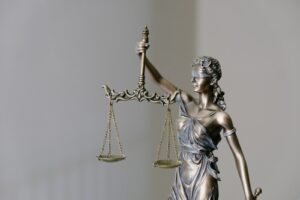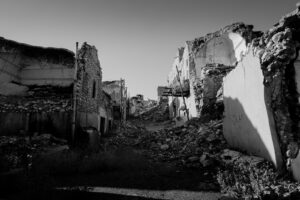I always find myself surprised by how dense, and diverse, the book of Micah is, despite its seven short chapters. Micah’s prophetic critiques of social injustice are among the most incisive, and harsh, of any biblical prophet we encounter. Woven throughout the scathing indictments are equally arresting images of hope. The core material from the 8th century BCE had several later additions, which have been edited together to create an artful movement between judgment and hope. Later biblical writers looked to both aspects of the book, critique and expectation, as important resources for understanding their own context.
It was Micah’s reputation for challenging critiques that was remembered just a few generations later when Jeremiah’s prophecies led to calls for his death. EldersElders are leaders who exercise wisdom or leadership by virtue of their age and experience. In the New Testament elders, along with the chief priests and scribes, constituted the primary opposition to Jesus when he taught in Jerusalem. More who spoke out in his defense cited the case of Micah, who likewise had warned that Jerusalem would not keep them safe if they violated the covenantA covenant is a promise or agreement. In the Bible the promises made between God and God's people are known as covenants; they state or imply a relationship of commitment and obedience. More, a startling claim that many saw as seditious. In JeremiahProphet who condemned Judah's infidelity to God, warned of Babylonian conquest, and promised a new covenant. More 26, the elders quoted from Micah 3 in which he prophesied that the injustice being perpetrated would cause Jerusalem to become “plowed like a field” and a “heap of rubble” and the templeThe Jerusalem temple, unlike the tabernacle, was a permanent structure, although (like the tabernacle) it was a place of worship and religious activity. On one occasion Jesus felt such activity was unacceptable and, as reported in all four Gospels, drove from the temple those engaged... More itself “a mound overgrown with thickets” (Jeremiah 26:8 quoting Micah 3:12).
In the gospel of Matthew’s second chapter, we encounter a different engagement with the book, quoting Micah 5’s vision of a future ruler who would come from a small, insignificant place and whose reign would bring peace and security.
“But you O Bethlehem of Ephrathah,
who are one of the little clans of JudahJudah was the name of Jacob's fourth son and one of the 12 tribes. More,
from you shall come forth for me
one who is to rule in Israel
whose origin is from of old,
from ancient days.” (Micah 5:2)
MatthewA tax collector who became one of Jesus' 12 disciples. More offers an important exegetical insight from Micah’s prophecyProphecy is the gift, inspired by God, of speaking and interpreting the divine will. Prophets such as Amos, Isaiah, and Ezekiel spoke words of judgment and comfort to the people of Israel on behalf of God. More, recognizing a clear biblical precedent for expecting divine salvationSalvation can mean saved from something (deliverance) or for something (redemption). Paul preached that salvation comes through the death of Christ on the cross which redeemed sinners from death and for a grace-filled life. More from an unlikely source, in this case, a small infant born in humble circumstances (Matthew 2:5).
It is both Micah’s intolerance for injustice and his recognition that God acts in unexpected ways that offer important theological insight for us today. The book of Micah does not simply move back and forth between two poles—judgment and hope—but offers a careful connection between the two. Micah’s incisive critiques of the people’s failures become the seedbed for imagining future flourishing. In Micah 2, the prophet criticizes the powerful for having oppressed the vulnerable simply because they can. Their deeds are premediated, planned with precision and then executed flawlessly.
“Woe to those who devise wickedness
and evil deeds on their beds!
When the morning dawns, they perform it,
because it is in their power.
They covet fields and seize them,
houses and take them away;
they oppress householder and house,
people and their inheritance.” (2:1-2)
The systematic oppression Micah sees is so egregious that he describes it in violent terms, likening the harm done to that of cannibals.
“Should you not know justice?—
you who hate the good and love the evil,
who tear the skin off my people
and the flesh off their bones,
who eat the flesh of my people,
flay their skin off them,
break their bones in pieces,
and chop them up like meat in a kettle,
like flesh in a cauldron.” (3:1-3)
Micah’s words here are among the sharpest of any prophetic critique we find. The metaphor portrays overconsumption and oppression as human rights abuses in which the vulnerable are killed, their bodies desecrated and consumed. Action verbs dominate the description—tear, eat, flay, break, chop—intentionally shocking the hearer. Elsewhere Micah accuses those in power of waging war against the peaceful, “But you who rise up against my people like an enemy; you strip the robe from the peaceful, from those who pass by trustingly with no thought of war” (2:8). He condemns leadership that has become corrupt, taking money to offer unjust rulings, teachings, and prophecies for money (3:11). In the face of such abuses, the prophetic critique is forceful and unequivocal, declaring in no uncertain terms that God will not allow such abuse and violence to continue.
But the book also offers a hopeful vision for what the future might look like if each of these types of violence were reversed. In Micah 4, God will serve as judge (4:3) rather than corrupt leaders who accept bribes (3:9-11). Where the powerful made themselves enemies to the peaceful (2:8), now weapons of war will be transformed into agricultural implements (4:3). Rather than the powerful “eating” the vulnerable, tearing skin and flesh off people and breaking and chopping them up like meat in a kettle (3:2-3), God allows all to eat the goods that they produce, benefitting from their own labors rather than having their work exploited.
“He will judge between many peoples
and shall arbitrate between strong nations far away;
they will beat their swords into plowshares
and their spears into pruning hooks;
nation shall not lift up sword against nation;
neither shall they learn war anymore;
but they shall all sit under their own vines and under their own fig trees,
and no one shall make them afraid,
for the mouth of the LORD of hosts has spoken.” (4:3-4)
It feels altogether too easy to be stymied when we look around at social and political dynamics, unable to imagine anything beyond current realities and systems that are broken and oppressive. In the book of Micah, however, the current situation is not the final word but also a means to foster hope, hope that is grounded concretely in reversals of the current social failures.
As we read the book of Micah, may we have clear-sighted vision of the present, and find in it the seeds for imagining a life-affirming future in which all will flourish in God’s kingdom.






